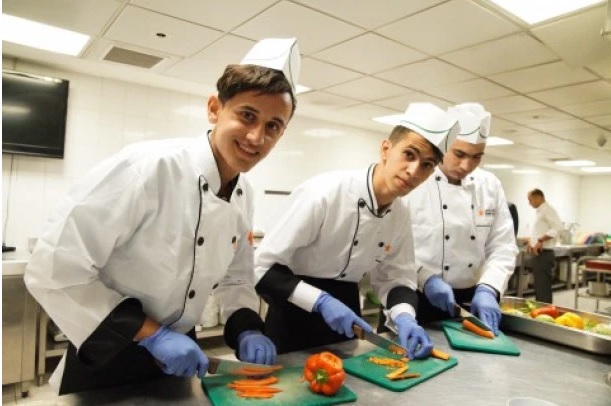العودة

TVET in the Arab World: A Growing Need for Skilled Labour
اليونسكو
2023 - 06 - 18
Technical and Vocational Education and Training (TVET) has become a major area of focus for the Arab countries and people. As the Arab region continues to develop economically, the need for skilled labour in numerous sectors grows. TVET programmes are essential for providing the necessary technical and
vocational skills to the region’s growing labour force. The demand for skilled labour in the Arab world is driven by several factors.
These include a rapidly growing population, the need for diversified economic development, the increasing importance of the service sector and the increasing impact of new technologies in defining new working areas and conditions. In order to meet the needs of the region’s labour force, TVET programmes must be tailored to meet the needs of the region’s particular socio-economic context.

Technical and Vocational Education and Training (TVET) has become a major area of focus for the Arab countries and people. As the Arab region continues to develop economically, the need for skilled labour in numerous sectors grows. TVET programmes are essential for providing the necessary technical and vocational skills to the region’s growing labour force. The demand for skilled labour in the Arab world is driven by several factors.
These include a rapidly growing population, the need for diversified economic development, the increasing importance of the service sector and the increasing impact of new technologies in defining new working areas and conditions. In order to meet the needs of the region’s labour force, TVET programmes must be tailored to meet the needs of the region’s particular socio-economic context.
The Youth Declaration on Transforming Education highlighted that young people are at the forefront of pioneering innovations, mobilizing peers and communities, and advocating for universal and quality education. Youth skills development is also at the heart of UNESCO’s Strategy for TVET 2022-2029 and its mission to transform TVET for successful and just transitions, which is highlighted on its official website UNESCO-UNEVOC.
TVET programmes in the Arab region are being implemented in a number of ways. Arab governments are investing in programmes that are designed to develop their youth’s technical and vocational skills. Private sector employers are also creating their own TVET programmes to meet the needs of their specific industries. Additionally, a number of regional and international organizations are providing technical assistance and funding to support TVET in the region. Despite the progress that has been made, the demand for skilled labour in the Arab world remains high. This is due to a number of factors, such as the lack of job opportunities, the need to keep up with technological advances and the need to prepare youth for the world of work. To meet this demand, governments, private sector employers, and international organizations are continuing to invest in TVET.
These programmes are helping create a more skilled labour force in the region. As a result, the region is seeing an increase in employment opportunities and an improvement in the quality of life. Additionally, the programmes are providing youth with the skills they need to take advantage of the region’s growing economy.
Much has been accomplished in the Arab region, but there is still a lot of work to be done. It is important that governments, private sector employers and international organizations continue to strengthen and invest in TVET in order to ensure that youth are being provided with the necessary skills to succeed in the 21st century.
To learn more about the TVET situation in the Arab world: https://unevoc.unesco.org/home/TVET+Country+Profiles
أحدث المنشورات
القائمة الكاملةاليونسكو
المستقبل على المحك: لماذا الاستثمار في التعليم أمر بالغ الأهمية؟
يسلط هذا التقرير، الذي أعدّته اللجنة التوجيهية الرفيعة المستوى المعنية بالهدف الرابع من أهداف التنمية المستدامة (SDG4) بالتعاون مع الشراكة العالمية من أجل التعليم (GPE) ونُشر في عام 2024، الضوء على الحاجة المُلِحّة لتعزيز الاستثمار في التعليم كوسيلة أساسية لمواجهة التحديات العالمية، بما في ذلك تغيّر المناخ، والتطورات التكنولوجية، والتحوّلات الديموغرافية.
اليونسكو
المدن العربية تتألق في جوائز مدن التعلم لليونسكو لعام 2024
تُحرز المدن العربية تقدمًا كبيرًا في مجال التنمية المستدامة والتعلم مدى الحياة، مع تركيز متزايد على إنشاء بيئات تعليمية شاملة تُسهم في تحقيق الأهداف التنموية المحلية والعالمية. وقد احتفلت جوائز مدن التعلم لعام 2024، التي تُمنح من قِبَل اليونسكو، بهذه الجهود، مبرزةً المدن العربية التي تميزت في بناء مجتمعات تعليمية.
اليونسكو
مؤتمر اليونسكو العالمي الثالث للموارد التعليمية المفتوحة: تعزيز الوصول الشامل إلى المعرفة
انطلق مؤتمر اليونسكو العالمي الثالث للموارد التعليمية المفتوحة (OER) في 19 نوفمبر/تشرين الثاني 2024، في مركز دبي التجاري العالمي في دولة الإمارات العربية المتحدة، ليكون المرة الأولى التي يُستضاف فيها هذا الحدث في العالم العربي. نظّم مؤتمر اليونسكو بالتعاون مع مؤسسة محمد بن راشد آل مكتوم للمعرفة (MBRF)واستقطب أكثر من 500 مشارك ومشاركة من نخبة القادة العالميين، وصنّاع السياسات، وممثلي المؤسسات التعليمية، بما في ذلك وزراء، وأكاديميون، وخبراء من القطاع الخاص. وتركّزت المناقشات على مدار يومين حول تعزيز الاستفادة من الموارد التعليمية المفتوحة والتقنيات الناشئة، بهدف تحقيق وصول عادل وشامل إلى التعليم، وتقليص الفجوة الرقمية على الصعيد العالمي.
اليونسكو
الأمم المتحدة تحتفي في شهر ديسمبر/كانون الأول بحقوق الإنسان، والأشخاص ذوي الإعاقة، واللغة العربية
تُحيي الأمم المتحدة في شهر ديسمبر/كانون الأول ثلاث مناسبات بارزة تُعنى بحقوق الإنسان، وبحقوق الأشخاص ذوي الإعاقة، وباللغة العربيّة، ممّا يجعل هذا الشهر فرصةً عالميّةً للتفكير والعمل. وتقود اليونسكو الجهود لتعزيز التعليم الشامل، وحماية حقوق الإنسان، والاحتفاء بالإرث الثقافيّ واللغويّ للّغة العربيّة، من خلال سلسلة من الفعاليات والمبادرات.